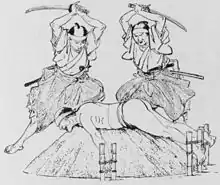
An illustration of ikido
Ikido (in Japanese:生き胴) is a Japanese execution method.
Information
Ikido translates to "living torso".[1] Ikido was invented during the Edo period and was used as a form of tameshigiri (test cutting) on living people and dead people.[2][3][4][5]
Prior to execution, a mound of dirt was set-up on the execution site. The condemned person was laid on their stomach on the dirt mound and then blindfolded. The condemned person was then slashed with a sword on their neck and torso simultaneously, slicing the person in two. [6] Sometimes after the execution, details of the execution were carved into the sword of the executioner.[7]
While mostly used as a form of capital punishment, ikido was also used on ordinary citizens.[8]
See also
References
- ↑ 用日本刀能将人一刀两断?浅谈日本刀与试斩文化 [Can you cut someone in two with a Japanese sword?] (in Chinese), zhuanlan, 2023, retrieved 13 March 2023
- ↑ Matsumura, Akira (1995). Daijisen (in Japanese). Shogakukan, Daijisen Editorial Department. p. 124. ISBN 9-78456-970-2667.
- ↑ Sesko, Markus (2014-09-30). Encyclopedia of Japanese Swords. Lulu.com. ISBN 978-1-312-56315-5.
- ↑ Wakasagi, Ken (2012). 御庭番通史 [A General History of Yu Tingban] (in Japanese). e-Bookland. p. 63. ISBN 9-78486-521-0293.
- ↑ Reikhaku - Issues 140-157 (in Japanese). Kokuritsu Rekishi Minzoku Hakubutsukan. 2007. p. 13.
- ↑ Okaya, Shigemi (2008). 新訳名将言行録 [New translation of famous general's statements] (in Japanese). PHP Institute. p. 54. ISBN 9-78456-970-2667.
- ↑ Nawa, Yumio (1983). Pictorial Historical Encyclopedia: Spears, Armor and Arms (in Japanese). New People Agency. p. 100.
- ↑ 日本刀の名刀「截断銘とは」 [What is the famous Japanese sword “Katdanmei”?] (in Japanese), meihaku.jp, retrieved 13 March 2023
This article is issued from Wikipedia. The text is licensed under Creative Commons - Attribution - Sharealike. Additional terms may apply for the media files.